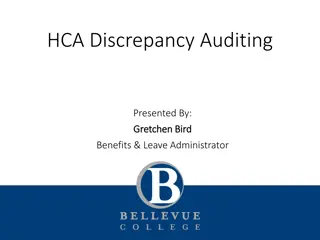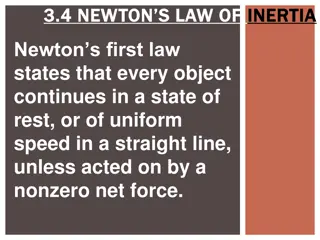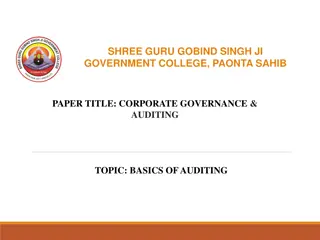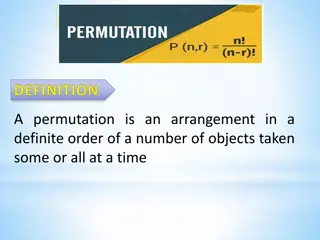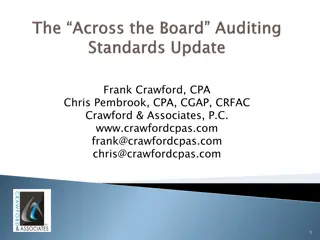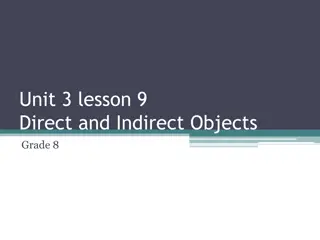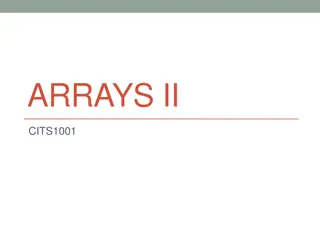Understanding Auditing: Types, Objects, and Differences Explained
Auditing in the field of commerce involves verifying accounts and statements to ensure accuracy and compliance, with a focus on detecting errors and frauds. This content covers the main and subsidiary objects of auditing, types of audits such as statutory and internal audits, and the differences between them. Dive into the world of auditing with detailed explanations and insights.
Download Presentation

Please find below an Image/Link to download the presentation.
The content on the website is provided AS IS for your information and personal use only. It may not be sold, licensed, or shared on other websites without obtaining consent from the author. Download presentation by click this link. If you encounter any issues during the download, it is possible that the publisher has removed the file from their server.
E N D
Presentation Transcript
Well Come to B.Com. III Deptt. Of Commerce Arts and Commerce College Kasegaon
Auditing (Advanced Accountancy Paper II) Prepared By : Dr. Shivaji R.Pawar M.Com.,M.Phil.,G.D.C.& A.,Ph.D. Head Dept. of Commerce, Arts and Commerce College Kasegaon Mob:8275377365 Email: srpawar65@gmail.com
Objects of Auditing The objects of auditing has classified in to two groups. i.e. main object and secondary or subsidiary objects. These are as follows. 1) Main Object : Initially the detection and prevention of errors and frauds was considered to be the main object of auditing. But now a day the numbers of business transactions are increased, the conduct of business is changed. In this changing scenario the detection and prevention of errors and frauds has become a subsidiary object. The main or primary object of the audit is now the verification of accounts and statements and to confirm the accuracy of them. The auditor has to see whether the financial statements disclose true and fair view of affair of the concern i.e. Balance Sheet shows the correct financial position and P. & L A/c shows correct profit or loss of the company. The auditor has to report to the concern organization whether the Balance Sheet and P & L A/c have been drawn properly as required by the companies act.
Conti.. 2) Secondary or Subsidiary Objects : At the early days the detection and prevention of errors and frauds was considered to be the main object of auditing.But now a day due to rapid changes in the volume and conduct of the business the detection and prevention of errors and frauds has become a subsidiary object. That means there are two basic subsidiary objects i.e. a) Detection and prevention of errors and b) Detection and prevention of frauds.
Secondary or Subsidiary Objects A) Errors: (Classes of Errors) B) Frauds : 1. Errors of Omission: 2. Errors of Commission : 3. Errors of Principles : 4. Compensating Errors : Misappropriation of cash. Misappropriation of goods. Fraudulent manipulation of accounts. Teeming and lading method
TYPES OF AUDIT Main Types of Audit Other Types of Audit: External / Statutory Audit: Internal Audit Continuous /Detailed Audit Annual / Periodical / Final audit: Balance Sheet Audit : Interim Audit: Special Audit: Partial Audit
Difference between Statutory Audit (External Audit) and Internal Audit S.N. 1 Point Appointment External Audit Appointment of external auditor is made by the share holders in Annual General Meeting(AGM). In certain cases it is appointed by directors or central Government. Internal Audit Appointment of internal auditor is made by the management itself, i.e. Chairman, Vice chairman or directors. 2 Status Status of the external auditor is independent. He enjoys separate statutory status. The internal auditor is dependent on management. He does not enjoy separate status. 3 Duties The duties of the statutory auditor are laid down by the law. The duties of the external auditor can be extended but not reduced. The duties of the internal auditor are decided by the management. The duties of the internal auditor can be reduced. 4 Objectives It is meant for management as well as for outsides and share holders for reliable financial data. It ensures that the P & L A/c and Balance Sheet of the organization shows true and fair view . It is meant for management. It ensures that the accounting procedure and system is fulfill the need of the company. 5 Nature The external audit is carried out periodically. Generally it is carried out at the end of the accounting year. The internal audit is carried out continuously throughout the year. 6 Method Generally in external audit the test checking system is adopted. It is a sampling audit Internal audit is a complete audit. It is carried out in detail. The auditor checks each and every item of the account. 7 Report External auditor submits his audit report to the share holders in Annual General Meeting. Internal auditor submits his audit report to the management. 8 Remuneration Remuneration of statutory auditor is fixed by share holders in their AGM. Remuneration of internal auditor is fixed by management.
Difference between Internal Check and Internal Audit: S.N. Point Internal Check Internal Audit 1 Type It is the organization of the staff for the checking of the work of one by the other It is the real and continuous audit of accounts 2 System of work In the internal check system the entries are passed in such a way that the work of one employee is checked by another at the same time In case of internal audit the work of employee is automatically checked by another after the former has finished the work 3 Purpose It is carried out for minimizing the errors and frauds It is carried out for detection of errors and frauds already committed 4 Work done In this system the work of recording and checking is done simultaneously Internal audit the checking is done of the entries already recorded 5 Type work of In this system the writing of books in such a way that work of one employee is automatically checked by other The work of internal auditor is audit the financial records recorded by employees time to time
Important Points of Vouching / Examination of vouching In order to carry out vouching efficiently the auditor should note the important points such as; Vouchers serially numbered: To avoid wastage of time all the vouchers should be numbered serially. They filed in the order of entries made in the books of accounts. Addressed to business name: Vouchers should be addressed to the business. It should not be addressed to personal name. Tally the dates: The date of the vouchers and the date of transaction to which it is relate should be tally. Vouching completed in one stretch: As far as possible the work relating to a particular period or a set of books should completed in one stretch. Signed by authority: Each and every voucher should be signed by the authorized person. It shows the correctness and legality of the vouchers. Match the amount in figures and words: The amount stated in vouchers should be in figure and in words. In addition to that the amount stated in figures and words should not differ.
Mark of inspection: The voucher which are checked or inspected by auditor should be marked by stamp. It avoids or reduced the misuse of audited voucher. Explanation for duplicate vouchers: If any voucher is not available the auditor should call for explanation. He should get the duplicate copy of voucher. In such case due precaution should be taken by auditor. Proper revenue stamp: The voucher should bear proper revenue stamp. If the amount of voucher is more than Rs. 5000, then it must be bear proper revenue stamp i.e.Re.1 revenue stamp. Noting of explanation: If any explanation called for vouching in respect of voucher, it should be noted in the personal note book by auditor. Entry for pre-paid and outstanding expenses: The voucher which is related to pre-paid or outstanding expenses and pre-paid or outstanding income the suitable adjustment entry should be made. Petty expenses: In case of certain petty expenses for which vouchers are not available, they should be checked with related documents. Properly recorded in financial books: The auditor should see that the vouchers are properly entered in proper financial book.
Company Auditor Qualification and Disqualification of a Company Auditor: Qualification: The following persons are qualified for appointment as auditor of a company. He should be qualified as per rules of central government. This qualification is as follows. An auditor of a company must be a Chartered Accountant (C.A), under Chartered Accountant Act 1949. A firm whose partners are qualified auditor may be appointed as companies auditor. The auditor is a holder of a certificate under the restricted auditor certificate rules 1959. The central govt. make rules about such auditor by notification.
Conti. Disqualification : The following persons are not qualified for appointment as auditor of a company A body corporate. An officer or employee of the company. A person who give guarantee for more than Rs 1000 or indebted to the company of Rs.1000. A partner of the companies. A person who is a director or member of the company. A person who holds more than 5% of nominal share capital of the company.
Conti. Appointment of Auditor : First auditor The first auditor shall be appointed by directors within one month of the registration of a company. This auditor works up to first annual general meeting (AGM). If directors does not appoint such auditor within one month it may appoint by company in annual general meeting. Next auditor Thereafter the company appoints an auditor in each annual general meeting. The duration of auditor is one year. It is from one AGM to next AGM. The appointed auditor should notice his acceptance or refusal to the registrar within 30 days. Appointment by govt. If the company does not appoint any auditor in annual general meeting in such case the central govt. may make the appointment of auditor. Casual vacancy - If the vacancy of auditor is casual it is filled by the board of directors. But if vacancy is due to resignation of an auditor in such case the vacancy is filled by company in special general meeting. Appointment by social resolution If more than 25% of subscribed share capital is held by any public financial institution or any state or central govt. or nationalized bank or insurance or re-appointment of an auditor maid by a special resolution. Re-appointment Reappointment of old auditor shall be made in annual general meeting. If he is disqualified or unwilling to do work a new auditor is appointed in annual general meeting.
Conti.. Removal of an Auditor: Following is the procedure of removal of an auditor of a company. The director has no power under any condition to remove an auditor from company. First auditor The first auditor can be removed by the members (share holder) in first annual general meeting. Subsequent auditor The subsequent auditor can be removed after completion of term only. Before the removal of such auditor 14 days notice should be given to them. Removal before turn If an auditor removed before the completion of turn the approval of company law board is necessary. Such approval is taken in annual general meeting. The removed auditor has a right to attend the general meeting in which the question of his removal has discussed. He has also right to speak in the meeting.
Conti Remuneration : As a general principals it can be stated that if the auditor is appointed by directors of a company the remuneration is fixed by the director. If the auditor is appointed by central or state govt. the remuneration is fixed by respective govt. In other case the remuneration is fixed in annual general meeting of the company.
Rights of an Auditor : The rights of an auditor are discussing in Companies Act 1956. The important rights are as follows. Right to get information Auditor has right of getting information and explanation from officer of a company. It is necessary for the performance of the duties. Right to aces books of account & vouching The auditor is entitled to have aces at all times to the books of account and vouching of the company. Right to receive particulars Auditor has right to get particulars or information which is given in the final accounts e g.- trading, profit and loss account, manufacturing account, P & L A/c, profit and loss appropriation a/c, Balance Sheet etc. He also gets the particulars from any other documents. Right to get opinion When auditor feels necessary to take an opinion of an expert in a particular field, he has a right to get such opinion from expert.
Conti Right to visit branches If the branches are not audited from qualified auditor, in such case he has a right to visit and check the record and various books of accounts of the branches. Right to attend meeting An auditor has a right to receive notice of the annual general meeting. He has also to attend the AGM. Right to receive remuneration Auditor has a right to demand his remuneration after completion of audit work. Right of access the branch books If the accounts of the branches are not audited, in such case the main auditor has a right to access all the books of accounts and vouchers of the branches.
Specimen of Qualified Audit Report To, The Members / Share Holders X.Y.Z. Company Ltd Address We have audited the annexed balance sheet of the XYZ Company Ltd. as on 31st march, 2017 and profit and loss a/c of the company for the year ended all that date and before that - We have obtained all the information and explanation which to the best of our knowledge and belief was necessary for the purpose of audit. In our opinion proper books of accounts as require by the law have been kept by the company, so far as appears from examination of books. The balance sheet and profit and loss A/c dealt with by this report are in arrangement with the books of account. Subject to the reservation noted below in our opinion and the best of our information and according to the explanation given to us, the accounts give information required by the companies act 1956 in the manner so required and gave true and fair view In the case of the balance sheet of the state of affairs of the company as on In the case of the profit and loss a/c of the profit or loss for the ended on that debt : The provision for depreciation on building is inadequate The trading profit of the company is over stated to the extent of Rs. 25000 The stock of raw material is overvalued by Rs. 30000 A sum of Rs. 50000 has been advance to a director of the company is against the law. A some of Rs. 20000 paid to supplier by cash which is against the law. Date Signature (Name of C.A. / Firm Seal)






